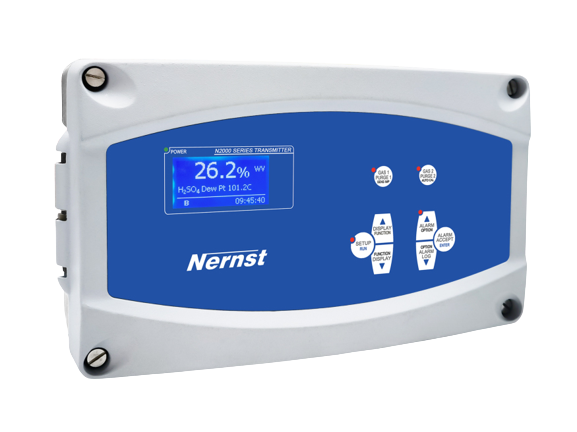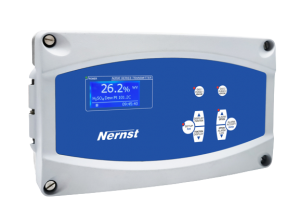Nernst N2035A ACID dewpoint analyzer
Application range
The Nernst N2035A ACID dewpoint analyzer is an instrument for real-time on-line monitoring the acid dewpoint temperature in the flue gas of boiler and heating furnace.
According to the measured acid dew point temperature, the exhaust gas temperature of boiler and heating furnace can be effectively controlled. Reduce low temperature sulfuric acid dew point corrosion of equipment. Improve the thermal efficiency of operation. Increase the boiler operation safety and prolong the service life of the equipment.
Application characteristics
After using Nernst N2035A ACID dewpoint analyzer (acid dew), you can accurately know the acid dewpoint value, oxygen content, steam (% water vapor value) or dew point (-50 °C ~ 100°C), water content (g / kg) and humidity value RH in the flue gas of boiler and heating furnace.
The user can control the exhaust gas temperature within a range slightly higher than the acid dew point of the flue gas according to the display of the instrument or two 4-20mA output signals. To avoid low-temperature acid corrosion and increase boiler operation safety.
Application principle
In industrial boilers or power plant boilers, petroleum refining and chemical enterprises and heating furnaces. Fossil fuels (natural gas, refinery dry gas, coal, heavy oil, etc.) are generally used as fuels.
These fuels contain more or less a certain amount of sulfur, which will produce SO2 in the process of peroxide combustion. Due to the existence of excess oxygen in the combustion chamber, a small amount of SO2 further combines with oxygen to form SO3, Fe2O3 and V2O5 under normal excess air conditions. (flue gas and heated metal surface contain this component).
About 1 ~ 3% of all SO2 is converted to SO3. SO3 gas in high-temperature flue gas does not corrode metals, but when the flue gas temperature drops below 400°C, SO3 will combine with water vapor to generate sulfuric acid vapor.
The reaction formula is as follows:
SO3 + H2O ——— H2SO4
When sulfuric acid steam condenses on the heating surface at the tail of the furnace, low-temperature sulfuric acid dew point corrosion will occur.
At the same time, the sulfuric acid liquid condensed on the low-temperature heating surface will also adhere to the dust in the flue gas to form sticky ash that is not easy to remove. The flue gas channel is blocked or even blocked, and the resistance is increased, so as to increase the power consumption of induced draft fan. Corrosion and ash blockage will endanger the working condition of boiler heating surface. Since the flue gas contains both SO3 and water vapor, they will produce H2SO4 vapor, resulting in the increase of acid dew point of flue gas. When the flue gas temperature is lower than the acid dew point temperature of the flue gas, H2SO4 steam will adhere to the flue and heat exchanger to form H2SO4 solution. Further corrodes the equipment, resulting in heat exchanger leakage and flue damage.
In the supporting devices of the heating furnace or boiler, the energy consumption of the flue and heat exchanger accounts for about 50% of the total energy consumption of the device. The exhaust gas temperature affects the operating thermal efficiency of heating furnaces and boilers. The higher the exhaust temperature, the lower the thermal efficiency. For every 10°C increase in the exhaust gas temperature, the thermal efficiency will decrease by approximately 1%. If the exhaust gas temperature is lower than the acid dew point temperature of the flue gas, it will cause equipment corrosion and cause safety hazards to the operation of heating furnaces and boilers.
The reasonable exhaust temperature of heating furnace and boiler should be slightly higher than the acid dew point temperature of flue gas. Therefore, determining the acid dew point temperature of heating furnaces and boilers is the key to improving operating thermal efficiency and reducing operating safety hazards.
Technical characteristics
• Dedicated probe measurement: One analyzer can simultaneously measure oxygen content, water dew point, moisture content, and acid dew point.
• Multi-channel output control: The analyzer has two 4-20mA current output and computer communication interface RS232 or network communication interface RS485
• Measurement range:
0°C~200°C acid dew point value
1ppm~100% oxygen content
0~100% water vapor
-50°C~100°C dew point value
Water content (g/Kg).
• Alarm setting: The analyzer has 1 general alarm output and 3 programmable alarm outputs.
• Automatic calibration: The ACID dewpoint analyzer will automatically monitor various functional systems and automatically calibrate to ensure the accuracy of the analyzer during measurement.
• Intelligent system: The analyzer can complete the functions of various settings according to the predetermined settings.
• Display output function: The analyzer has a strong function of displaying various parameters and a strong output and control function of various parameters.
• Variable parameter selection: It can be selected according to different fuels (lignite, washed coal, pulverized coal, natural gas, blast furnace gas, heavy oil, various grades of fuel oil, etc.), SO2 generated by different sulfur content, and the conversion rate of each fuel into SO3, directly obtain high-precision combustion flue gas acid dew point values for various fuels.
• Installation is simple and easy: The installation of the analyzer is very simple and there is a special cable to connect with the zirconia probe.
Specifications
Display method
• 32-bit color English digital display
Outputs
• Two channels 4~20mA DC linear
• Acid dew point,
• Water vapor
• Water content
• Water dew point,
• Residual oxygen
• Four way program alarm relay
• RS232 serial communication
• RS485 network communication
Range: set by keyboard
• 0°C~200°C acid dew point value
• 0~100% water vapor
• 0~100% humidity value
• 0~10000g/Kg
• -50°C~100°C dew point
All output ranges are adjustableary Parameter Displayy Parameter Display
AccuracyP
• Accuracy ±0.5°C
• Resolution 0.1°C
• Repeat accuracy ±0.5%
Other measurement accuracy is calculated based on the accuracy of oxygen measurement
Applicable flue gas temperature
• 0~1400°C
SO2 base
10ppm~15%
SO3 conversion
0.1%~6%
Reference gas
Reference gas adopts micro-motor vibration pump
Power Ruireqements
85VAC to 264VAC 3A
Operating Temperature
Operating Temperature -40°C to 60°C
Relative Humidity 5% to 95% (non-condensing)
Degree of Protection
IP65
IP54 with internal reference air pump
Dimensions and Weight
300mm W x 180mm H x 100mm D 3.0kg





